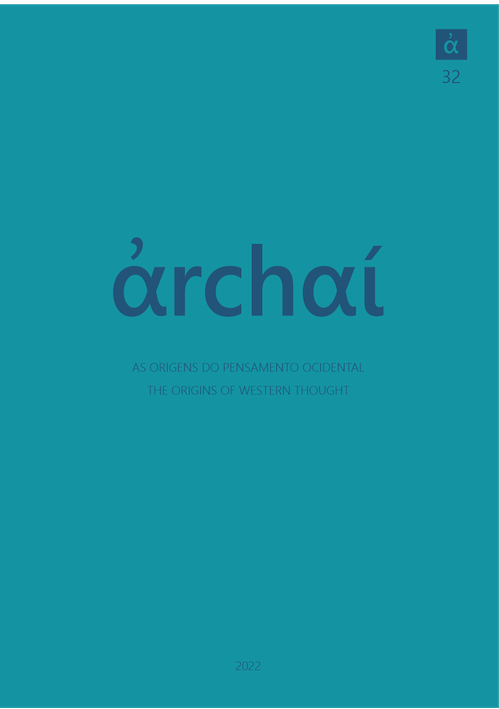The association between mythos and logos in the Phaedo, or on how to reach the logos that is “most difficult to refute”
DOI:
https://doi.org/10.14195/1984-249X_32_12Keywords:
elenchos, mythos, logos, noble lieAbstract
In the Phaedo, after offering several arguments in favour of the immortality of the soul, a mythos is introduced about its afterlife. Given the tenor of the topic at hand and the human limitations in coming up with strictly true logos on the subject, Socrates and his associates agree that the "most difficult to refute" (dysexelenktotaton, 85d1) should be sought among the human logoi. This paper attempts to determine to what extent the association between the myth presented towards the end of the dialogue and the preceding arguments contributes to this goal. In this sense it intends to show, on the one hand, that the myth mentioned has the characteristics of the noble lie in R. II-III -a text that suggests the need to use tales that, despite being fictional, are useful to establish justice in the soul of the audience-; and, on the other hand, that because of its persuasive character, the myth contributes to strengthen the logos developed so far in order to make it as irrefutable as possible, generating faith in the importance of virtuous life, even in the audience that is not part of the philosophical circle.
Downloads
References
ANNAS, J. (1982). Plato's Myths of Judgement. Phronesis 27, n. 2, p. 119-143.
BOSSI, B. (2016). La esperanza de Sócrates: ¿cuestión de argumentos o encantamientos? (notas al Fedón). Archai 16, p.147-182.
BRISSON, L. (1982). Platon, les mots et les mythes. Paris, Maspero.
DESTRÉE, P. (2021). Spectacles from Hades. On plato’s myths and allegories in the Republic. In: COLLOBERT, K.; DESTRÉE, P.; GONZÁLEZ, F. (eds.) Plato and myth: studies on the use and status of Platonic myths. Leiden, Brill, pp. 109-124.
CROTTY, K. (2010). The Philosopher's Song: The Poets' Influence on Plato. Washington, Lexington Books.
DIVENOSA, M.; MÁRSICO, C. (2005). Platón. República, traducción, introducción y notas. Buenos Aires, Losada.
DIVENOSA, M. (2008). Platón. Menón, traducción, introducción y notas. Buenos Aires, Losada.
DODDS, E. (1959). Platón. Gorgias, A revised text with introduction and commentary. Oxford, Clarendon.
GADAMER, H. G. (1980). Dialogue and Dialectic: Eight Hermeneutical Studies on Plato (trans. with an introduction by Smith, P. C.). New Haven and London: Yale University Press.
GALLOP, D. (1975). Plato. Plato’s Phaedo. Oxford, University Press.
GARCIA GUAL, C. (2014). Platón. Fedón. Barcelona, Editorial Gredos.
GOLDSCHMIDT, V. (1971). Platon. Les Dialogues de Platon: Structure et Méthode dialectique. Paris, Thèse d'État Lettres.
MARCOS, G. (2022). Dialectic and Refutation in Plato. On the Role of Refutation in the Search for Truth. Archai 32.
MARCOS DE PINOTTI, G. (2008). Mentiras semejantes a verdades según Platón. Justificación y alcance del pseûdos en República II. Revista de Filosofía Univ. Costa Rica 46, n. 117/118, p. 95-103.
MORGAN, K. A. (2000). Myth and philosophy from the Presocratics to Plato. Cambridge, Cambridge University Press.
NADDAF, G. (2016). Poetic Myths of the Afterlife: Plato’s Last Song. In: BENITEZ, R. (ed.) Plato’s Poetics. London, Academic Printing and Publishing.
PARTENIE, C. (ed.) (2004). Plato. Plato. Selected Myths, New York, Oxford University Press.
PETRAKI, Z. (2011). The Poetics of Philosophical Language: Plato, Poets and Presocratics in the Republic. Berlin, de Gruyter.
SCOTT, G. (ed.) (2002). Does Socrates have a Method? Rethinking the elenchus. University Park, Pennsylvania State University Press.
TAYLOR, C. C. W. (1976). Plato. Plato: Protagoras. Oxford, Oxford University Press.
VIGO, A. (2009). Platón. Fedón. Traducción, notas e introducción. Buenos Aires, Colihue.
VLASTOS, G. (1982) The Socratic Elenchus, Journal of Philosophy 79, n. 11, p. 711-714.
Downloads
Published
How to Cite
Issue
Section
License
Copyright (c) 2022 Julián Macías

This work is licensed under a Creative Commons Attribution 4.0 International License.
Given the public access policy of the journal, the use of the published texts is free, with the obligation of recognizing the original authorship and the first publication in this journal. The authors of the published contributions are entirely and exclusively responsible for their contents.
1. The authors authorize the publication of the article in this journal.
2. The authors guarantee that the contribution is original, and take full responsibility for its content in case of impugnation by third parties.
3. The authors guarantee that the contribution is not under evaluation in another journal.
4. The authors keep the copyright and convey to the journal the right of first publication, the work being licensed under a Creative Commons Attribution License-BY.
5. The authors are allowed and stimulated to publicize and distribute their work on-line after the publication in the journal.
6. The authors of the approved works authorize the journal to distribute their content, after publication, for reproduction in content indexes, virtual libraries and similars.
7. The editors reserve the right to make adjustments to the text and to adequate the article to the editorial rules of the journal.



